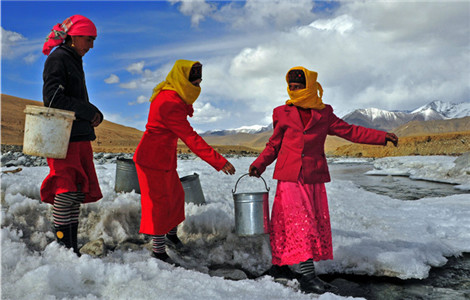Film explores urbanization's mixed bag
Updated: 2015-03-06 06:05
By MAY ZHOU in Houston(China Daily USA)
|
||||||||
 |
|
Adam Smith talks about his documentary film The Land of Many Palaces at the Asia Society Texas Center on Wednesday night. [Photo by MAY ZHOU / CHINA DAILY] |
Ordos in China's Inner Mongolia was once dubbed the world's biggest ghost town by the Western mainstream media and cited as a prime example of China's busted housing bubble.
Filmmaker Adam Smith first saw a photo essay of the so-called Ghost City of Ordos in Time magazine in 2010. He was intrigued and took a trip there to see it for himself.
In the end, Smith learned that it was not the ill-conceived housing project the Western media had reported, but rather an urbanization testing ground by the central government to relocate rural populations.
China has announced a nationwide urbanization plan to move 250 million farmers from the countryside to cities in the next two decades. It would be the largest mass migration in human history.
Between 2012 and 2014, Smith and Chinese filmmaker Song Ting traveled to Kangbashi, a new district of Ordos, every couple of months to document the process. The result is the independent documentary film The Land of Many Palaces, which was screened on Wednesday night at the Asia Society Texas Center.
"We realized that this is a really interesting story and spoke of China's push for urbanization all across the country," said Smith.
The film opens with half-constructed buildings standing on an empty field. Soon the scene shifts to their completed form: a shinny new town center larger than Tiananmen Square surrounded by modern buildings with no traffic congestion.
A government employee named Xiaomei shows elderly farmers how to use modern amenities such as a hot shower, gas stove, electric kettle and toilet.
Following Xiaomei, the film shows how government officials convince the farmers to move into the city, teaching them how to adapt to urban lifestyle, and how people are adjusting to the new living situation.
"There is a mixture of emotions in the new city: boredom, confusion and excitement," said Smith.
The film also shows that some farmers, including Xiaomei's own parents, cling to their traditional self-sufficient lifestyle – raising sheep and pigs, growing their own vegetables – and refuse to move into the city.

 Highlights on the Internet industry in Premier Li's work report
Highlights on the Internet industry in Premier Li's work report
 Daily snapshots of 'two sessions' - March 6
Daily snapshots of 'two sessions' - March 6
 Railway stations witness return peak across China
Railway stations witness return peak across China
 Across America over the week (from Feb 27 to March 5)
Across America over the week (from Feb 27 to March 5)
 Living amid the mountains
Living amid the mountains
 Plane skids off LaGuardia runway during snowstorm in NYC
Plane skids off LaGuardia runway during snowstorm in NYC
 The Legend of Mulan told at Lincoln Center
The Legend of Mulan told at Lincoln Center
 Six things you may not know about Awakening of Insects
Six things you may not know about Awakening of Insects
Most Viewed
Editor's Picks

|

|

|

|

|

|
Today's Top News
Kerry briefs Europeans on Iran nuke talks
Solar-powered plane prepares to fly around the world
Government plans to reform foreign investment law
European Union eyes joint efforts over global warming
Birthing centers mum after raid in California
4 Chinese students look to take 'risk'
China likely to maintain 7% growth for 20 years
China's top two train makers to merge
US Weekly

|

|







